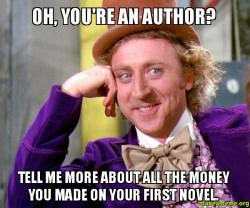The theme for this month revolves around what makes a particular author’s work recognizable to their audience. I thought I would take the reverse of this idea — What if you write under several different pseudonyms and don’t want them connected?
This is the issue I have to deal with. I don’t want readers of my horror books to get cross-pollinated into my romance and erotica readers. In other words, don’t get your peanut butter on my chocolate.
Why Not?
 You may wonder why I wouldn’t want this to happen. After all, more eyeballs can mean more sales. The problem is that readers of my horror or science fiction titles go in expecting particular tropes and methodologies. Those few folks who go looking for titles under my (real) name want to read something in the “GADM” style. If they see a new book and buy it, they may get a surprise when they start reading an erotic thriller with lots of sexual tension and graphic sex instead of a horror novel with lots of “Dad” jokes and punny humor.
You may wonder why I wouldn’t want this to happen. After all, more eyeballs can mean more sales. The problem is that readers of my horror or science fiction titles go in expecting particular tropes and methodologies. Those few folks who go looking for titles under my (real) name want to read something in the “GADM” style. If they see a new book and buy it, they may get a surprise when they start reading an erotic thriller with lots of sexual tension and graphic sex instead of a horror novel with lots of “Dad” jokes and punny humor.
Indeed, I was talking to a friend on Facebook who had just received a low-star review of their novel. The reviewer was not happy that the book contained QUILTBAG/LGBT characters instead of straight old meat-and-potatoes science fiction. Of course, never mind that there are all kinds of folks from many different backgrounds in every universe, even if the author doesn’t include them in their scribblings. That didn’t matter to the reader. They saw an “other” and was unhappy, which is kind of ironic when science fiction is all about “others” from different planets.
For me, when it comes to different genres, I tend to try and keep some of them separated. Erotica and romance are separated from my westerns (except weird westerns), which are separate from my speculative fiction (horror, fantasy, and science fiction). I also have some literary floating out there in the ether. Keeping them separate helps to keep the folks who read a particular genre happy.
As far as QUILTBAG/LGBT characters, they can appear anywhere in my writing, just like the actual people do in real life. I’ll gladly take the review hit, and I’ll even be happy about it.
OK, What Can I Do?
 If you’re going to be writing under different pseudonyms, you need to do a solid analysis of your writing style. There are particular phrases and words that crop up with every author, for example. Think about the first three George Lucas Star Wars movies (in theatre release order). How many times have you heard Darth Vader say “is complete”? It drives me nuts when I hear those words, but it’s a Lucasism. Even the scripts he didn’t completely write have his smudgy thumbprints all over the pages.
If you’re going to be writing under different pseudonyms, you need to do a solid analysis of your writing style. There are particular phrases and words that crop up with every author, for example. Think about the first three George Lucas Star Wars movies (in theatre release order). How many times have you heard Darth Vader say “is complete”? It drives me nuts when I hear those words, but it’s a Lucasism. Even the scripts he didn’t completely write have his smudgy thumbprints all over the pages.
If you look back over the posts from this month on The Fictorians, there are a lot of ideas to investigate as far as your own writing is concerned. Find the pieces that fit with your style and make a list.
- Writes with lots of humor.
- Tends to use some colloquialisms.
- Writes dialogue in a short, choppy, realistic style.
- Focuses less on description.
- Plots are unpredictable with some red herrings dropped in.
Once your list is complete, you have some ideas on what not to do for your alternate identity. In fact, you can do things like focus more on descriptions and purposely read and study that subsection of writing. This way you’ll be able to improve your skills all across the board. Try adding in some humor if you’re known as a business-only author.
In fact, you can even purposely create a new pseudonym so you can write in a different area like romance or historicals. This way you can learn your craft without tainting your “real” well-established name.


 While many authors think they have a good idea of what they’re good at, sometimes they’re wrong. This isn’t necessarily a bad thing — in fact, having a couple of things that make you feel comfortable enough to actually sit your butt in a chair and pound a keyboard will help to keep procrastination and “writers block” away. When you feel advanced enough, ask your audience what they think you write best. Understand that you can use this knowledge to improve your writing.
While many authors think they have a good idea of what they’re good at, sometimes they’re wrong. This isn’t necessarily a bad thing — in fact, having a couple of things that make you feel comfortable enough to actually sit your butt in a chair and pound a keyboard will help to keep procrastination and “writers block” away. When you feel advanced enough, ask your audience what they think you write best. Understand that you can use this knowledge to improve your writing. I started to add in things such as verbal tags. In one short story I turned in this week for a submission call, the Captain had a habit of saying “Yes, yes,” while he was thinking what to say next.
I started to add in things such as verbal tags. In one short story I turned in this week for a submission call, the Captain had a habit of saying “Yes, yes,” while he was thinking what to say next. If only this was true. The best advice any professional author can give you is “don’t quit your day job.” You will need the income stability for yourself and your family, plus you may need the healthcare benefits if your day job provides them. Other benefits include life insurance and retirement contributions.
If only this was true. The best advice any professional author can give you is “don’t quit your day job.” You will need the income stability for yourself and your family, plus you may need the healthcare benefits if your day job provides them. Other benefits include life insurance and retirement contributions. I have yet to meet one, although I would hedge and say that J.R.R. Tolkien is probably one of the closest. Every author I know makes a ton of mistakes when writing. After all, that’s why editors were invented. Editors typically have a better grasp of the mechanics of language…or at least the great ones do. The editors will comb through your work and fix all of those comma splices and split infinitives, vacuum out the extra commas, and polish the correct letters when you use to, too, or two.
I have yet to meet one, although I would hedge and say that J.R.R. Tolkien is probably one of the closest. Every author I know makes a ton of mistakes when writing. After all, that’s why editors were invented. Editors typically have a better grasp of the mechanics of language…or at least the great ones do. The editors will comb through your work and fix all of those comma splices and split infinitives, vacuum out the extra commas, and polish the correct letters when you use to, too, or two. Is it hard work? Hell yes, it certainly is! It takes a lot of writing, editing, re-writing, and re-re-writing to put out a decent story. You can’t wait for your muse to inspire you if you’re gunning for the professional author title. Writers write, and that means there is no time for things like “writer’s block”. Can you imagine not selling coffee at your day job because you’re not feeling your coffee muse? Writing is just that, a job. That means you need to learn to be productive. There are a lot of suggestions and recommendations on how to do this on The Fictorians. In fact, this October and November, there will be a NaNoWriMo theme that stresses productivity.
Is it hard work? Hell yes, it certainly is! It takes a lot of writing, editing, re-writing, and re-re-writing to put out a decent story. You can’t wait for your muse to inspire you if you’re gunning for the professional author title. Writers write, and that means there is no time for things like “writer’s block”. Can you imagine not selling coffee at your day job because you’re not feeling your coffee muse? Writing is just that, a job. That means you need to learn to be productive. There are a lot of suggestions and recommendations on how to do this on The Fictorians. In fact, this October and November, there will be a NaNoWriMo theme that stresses productivity. Agatha Christie was a genius at employing red herrings. In Murder on the Orient Express, almost everything is a red herring pushing one away from focusing on the killer until you realize everyone was the killer. In her novel And Then There Were None, there’s a list of how people are going to get bumped off. Victim number four doesn’t seem to be a red herring until you realize that she told you flat out they were in the poem.
Agatha Christie was a genius at employing red herrings. In Murder on the Orient Express, almost everything is a red herring pushing one away from focusing on the killer until you realize everyone was the killer. In her novel And Then There Were None, there’s a list of how people are going to get bumped off. Victim number four doesn’t seem to be a red herring until you realize that she told you flat out they were in the poem. A fascinating red herring example is Professor Snape in the Harry Potter series. He’s constantly shown as a bad person throughout seven books until the last few chapters, where we finally learn that he has been trying to help Harry survive. All the red herrings are cleared up as we learn the truth, and the readers discover that the person they despised the most was the bravest person of all. That’s why Snape and, by extension, actor Alan Rickman went from evil villain to beloved savior.
A fascinating red herring example is Professor Snape in the Harry Potter series. He’s constantly shown as a bad person throughout seven books until the last few chapters, where we finally learn that he has been trying to help Harry survive. All the red herrings are cleared up as we learn the truth, and the readers discover that the person they despised the most was the bravest person of all. That’s why Snape and, by extension, actor Alan Rickman went from evil villain to beloved savior.